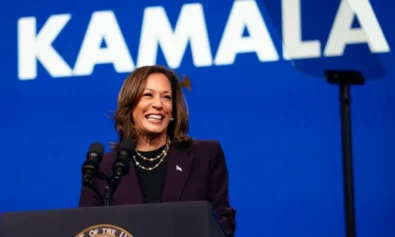Thousands of teachers are calling it quits across the country, leaving many school districts with a growing list of vacancies. The pandemic worsened teacher and education staff levels but did not create it, says Jason B. Allen, a special education teacher in Atlanta. “We were in a teacher crisis since 2016, this is not anything new,” he said.
“This mass exodus is really getting a lot of people’s attentions, because I feel like people are now choosing freedom,” said Cherie Robinson, 33, one of the 5,100 Florida teachers who left their teaching jobs recently.
President of Florida’s Education Association, Andrew Spar, said at the beginning of the school year the state was down 5,000 teachers and between August and October, the figure jumped to 5,100 in a viral TikTok video that sounded the alarm on a growing problem.
“This year, we’re actually seeing a slight increase nearly 5,100 teachers in the state of Florida and over 4000 vacancies among education staff professionals throughout the state,” said Spar.
Robinson taught second and third graders during her seven years in the classroom in Jacksonville, Florida. Many of her students came from underserved communities where housing instability, food insecurity, domestic violence and poverty were added burdens she had to help her students navigate, all while teaching a curriculum that only intensified with each passing month.
“This isn’t just teaching, I’m just not teaching you all to add and subtract, and how to read, there’s more to it than that. From administration, the initiatives that they’re driving, it just doesn’t align with what I was seeing,” said Robinson.
Robinson says policies created at the district and school board levels trickled down into the classroom adding more stress on teachers and students alike. Robinson noted her school sought to add an additional six extra minutes to the school day in the mornings to boost instruction, but Robinson says, that change only recued time for students who were already food insecure and did little to addressing bigger challenges teachers and students face.
She said decisions are being driven by test scores and numbers, leading her to believe schools are being run “like a business and not made to serve the community the school is in.”
The constant training sessions signifying more policies teachers had to incorporate into their daily lesson plans eventually took a toll on Robinson. “We’re exhausted. So are the parents. They don’t have the necessary tools, they’re not part of the PTA, they don’t know what’s going on, they don’t own the homes in their community, so they don’t really have a say in what happens in their schools, so it’s a cycle, a vicious cycle,” she said.
Jason B. Allen is a veteran educator of 17 years and says the issues have been mounting for years and reached a tipping point. “It’s not just teachers, it’s counselors, it’s bus drivers, it’s cafeteria workers, nurses and nurse practitioners,” said Allen of the wave of educators and support staff leaving their posts.
Like Robinson, he points to school district administrators failing to address critical issues, from giving teachers a say in policy decisions, to paying teachers more and providing adequate resources to make teaching more effective.
“If we are berating teachers, we’re overworking them, if we’re not valuing their voices and not paying them equitable wages, if we’re not supporting the work that’s happening in the classrooms, the courtyards, what’s happening in after-school programs, then we’re setting up not only our students up for failures, but also our work force,” said Allen.
While it is unclear exactly how many teachers have quit nationally at this time, both Allen and Robinson agree having fewer teachers, especially Black teachers, can be damaging to Black communities.
A RAND Corporation survey conducted in January and February of this year found that one in four teachers considered leaving the job, and Black teachers in particular were thinking about leaving. “The success rate for our community is based on those kids seeing us represented in those classrooms and in their schools,” said Robinson.
According to the National Center for Educational Statistics, only 7 percent of teachers in the U.S. are Black. A 2018 study from John Hopkins University and American University found that Black students who have one Black teacher are more likely to go to college. The study also says, having at least one Black teacher in elementary school reduced the chances of dropping out of school by 29 percent among low-income Black students and by 39 percent for very low-income Black boys.
“Representation is so important and not just having a Black face standing in front of children or whatever ethnicity, it needs to be intentional about people who are doing the work of improving schools,” said Allen.
Atlanta Public Schools Chief Human Resources Officer Skye Duckett says her district managed to weather the storm of a teacher shortage amid the pandemic. She attributes their fortunes largely to fewer teachers retiring than expected and by implementing much-needed support for its teachers, faculty, and staff, most of whom are Black.
“All of our pay, well-being initiatives, and mental health work is designed with our non-white staff in mind because that’s the vast majority of our work force,” said Duckett.
Duckett says Atlanta Public Schools gave its teachers and staff 3 percent to 9 percent pay raises and added more social workers and school psychologists for added support. The district also provided mental health resources to teachers and staff to help offset burnout and feeling overwhelmed. Special education educators and high poverty schools all received stipends on top of the pay increase. The school district used some of its federal stimulus money to help cover the costs of the added resources.
“Employees working in what may arguably be our hardest work settings and getting extra bumps in their pay this year and also teachers working in special education are getting stipends this year in addition to the regular pay raises,” said Duckett.
Some of the teachers and education support staff leaving the profession because of retirement while others are venturing into other career fields. Robinson says she is still determining her next move, but noted talk of entrepreneurship has been a recurrent conversation among educators.
“I say all the time, if you can run a classroom, you can run a business, because it’s just that many moving parts operating at one given time when you’re teaching,” said Robinson.


